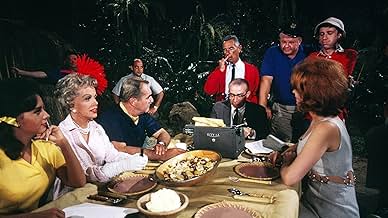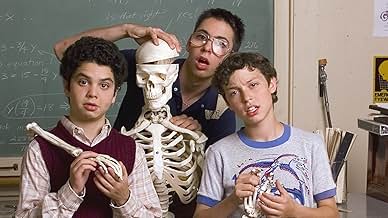Reunindo o público com os personagens de televisão com os quais cresceram enquanto introduzem comédias que certamente serão assistidas compulsivamente.Reunindo o público com os personagens de televisão com os quais cresceram enquanto introduzem comédias que certamente serão assistidas compulsivamente.Reunindo o público com os personagens de televisão com os quais cresceram enquanto introduzem comédias que certamente serão assistidas compulsivamente.
- Prêmios
- 1 indicação no total
Explorar episódios
Avaliações em destaque
I'm enjoying these episodes. I grew up watching many of these sitcoms and like hearing from the actors and others in the business how they lived or viewed them. Yes they touch on topics that were affected during those years and you may or may not agree with it but that's their history.
With a series like this they could have done a marvelous job talking about society, the business, the actors, the networks, etc. Instead they do a half-based job on everything. Why do it?
I thought this was supposed to be the history of sitcom. Instead it is a sloppy, quick run through some popular and lesser known sitcoms. It's basically a short interview, less than a minute, then footage from the show. The retrospective on the show are brief and poorly explained.
Each episode starts in the 50s and ends in present day. Each episode also complains about minorities, women, and homosexuals not being on TV or if they were it was shown in a very stereotypical form. I do agree with this idea, literally every episode devolves into this. They should have make one episode in the shunning of aforementioned groups. I would guess 60-70% of this series is complaints about how minorities were treated.
It's amazing that they had such an enormous body of work to comment on and they come up with this. Its not the worst documentary I have seen but given the production value and money behind the documentary It's amazing they go for such boring low hanging fruit.
If you are looking for any kind.
Each episode starts in the 50s and ends in present day. Each episode also complains about minorities, women, and homosexuals not being on TV or if they were it was shown in a very stereotypical form. I do agree with this idea, literally every episode devolves into this. They should have make one episode in the shunning of aforementioned groups. I would guess 60-70% of this series is complaints about how minorities were treated.
It's amazing that they had such an enormous body of work to comment on and they come up with this. Its not the worst documentary I have seen but given the production value and money behind the documentary It's amazing they go for such boring low hanging fruit.
If you are looking for any kind.
This is an excellent and thorough examination of many of the most popular sit-coms and how the medium - unique in its widespread influence - interacts with society. The episodes are watchable and light, due to the presentation consisting of quickly interspersed clips of the sitcoms themselves, news clips showing life outside the TV, and interviews with people who have devoted their entire lives to the industry (sometimes from childhood).
I appreciate how it looks at the whole history within each episode, focusing on a particular facet of society (family, work, sex, race, etc.). The viewer is able to join actors, writers, producers, and critics of the shows we've all grown up with and hear stories explaining how the paths of shows were forged and how current entertainment is related to the very different earliest shows of 70 years ago.
People who don't like the diversity being explored in society today - and therefore within up-to-date popular culture - might not appreciate the value of this. This documentary series is acknowledging the ways our world has changed, not politicizing (unlike many of the reviews listed here). It's a valuable contribution to the history of popular culture.
I appreciate how it looks at the whole history within each episode, focusing on a particular facet of society (family, work, sex, race, etc.). The viewer is able to join actors, writers, producers, and critics of the shows we've all grown up with and hear stories explaining how the paths of shows were forged and how current entertainment is related to the very different earliest shows of 70 years ago.
People who don't like the diversity being explored in society today - and therefore within up-to-date popular culture - might not appreciate the value of this. This documentary series is acknowledging the ways our world has changed, not politicizing (unlike many of the reviews listed here). It's a valuable contribution to the history of popular culture.
What should have been a fun and light hearted look back, with minimal social commentary sadly turned into a cringeworthy and often irrelevant , inaccurate over analysis that took all the air out of the balloon.
Rather too many people attempting to apply their on rather faulty and false social ethics to history that often simply made comedy for what it as, something to laugh at and with.
Many of these people had little or no direct involvement in the actual comedy creation process.
It seems as if CNN management sat round a table with a white board full of all the latest terms and words that had to be included in order to fulfil some false sense of diversity and wokeness.
But in the end, it delivered too much that made the viewer roll eyes, tut and sigh.
I tried so hard to look past the faux commentary and.enjoy reliving some moments from my past but the final straw came when Margaret Cho spoke of cultural appropriation and misogyny, not having a clue what each actually means and with such an airy tone that looked down upon the audience.
It is so ironic that what should be a celebration of comedy was too often used as an excuse to over analyse, make wholly subjective assumptions, presented as fact and completely forget the whole point of the exercise.
One of the frequent contributors was the editor in chief of the A. V. Club, that has a tagline 'Pop culture obsessives writing for the pop culture obsessed'.
Obsessed is correct but sadly, all the obsession has clouded the brain so much that the neurons cannot be seen for the grey matter.
Rather too many people attempting to apply their on rather faulty and false social ethics to history that often simply made comedy for what it as, something to laugh at and with.
Many of these people had little or no direct involvement in the actual comedy creation process.
It seems as if CNN management sat round a table with a white board full of all the latest terms and words that had to be included in order to fulfil some false sense of diversity and wokeness.
But in the end, it delivered too much that made the viewer roll eyes, tut and sigh.
I tried so hard to look past the faux commentary and.enjoy reliving some moments from my past but the final straw came when Margaret Cho spoke of cultural appropriation and misogyny, not having a clue what each actually means and with such an airy tone that looked down upon the audience.
It is so ironic that what should be a celebration of comedy was too often used as an excuse to over analyse, make wholly subjective assumptions, presented as fact and completely forget the whole point of the exercise.
One of the frequent contributors was the editor in chief of the A. V. Club, that has a tagline 'Pop culture obsessives writing for the pop culture obsessed'.
Obsessed is correct but sadly, all the obsession has clouded the brain so much that the neurons cannot be seen for the grey matter.
Você sabia?
- ConexõesReferenced in Late Night with Seth Meyers: Amy Poehler/Joseph Gordon-Levitt/Kevin Smith (2021)
Principais escolhas
Faça login para avaliar e ver a lista de recomendações personalizadas
- How many seasons does History of the Sitcom have?Fornecido pela Alexa
Detalhes
- Data de lançamento
- País de origem
- Central de atendimento oficial
- Idioma
- Também conhecido como
- L'histoire des sitcoms
- Empresa de produção
- Consulte mais créditos da empresa na IMDbPro
Contribua para esta página
Sugerir uma alteração ou adicionar conteúdo ausente





















